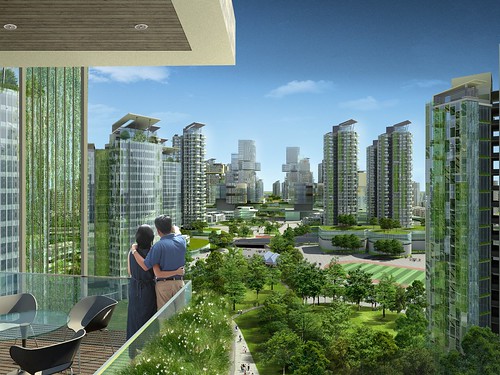Urban specialists, city mayors and senior government officials from Vietnam, Indonesia, the Philippines and Laos gather in Ho Chi Minh City today to move forward on putting the World Bank’s new Eco2 Cities program into action in their countries.

Eco2 Cities is the World Bank’s approach to sustainable and integrated urban development, and was launched last year as part of the Bank’s new corporate Urban and Local Government Strategy. Eco2 is designed to help cities plan, manage and invest in sustainable urban systems that are integrated, multi-functional and beneficial to the long term well being of citizens and society at large. By doing so it strives to help cities accomplish greater ecological and economic sustainability, with a focus on human and social well being.
The three-day workshop from June 7 to 9 fosters knowledge exchange on how the challenges and priorities of the participating countries and their cities might benefit from a new approach to urban development. The focus is on identifying unique points of entry for each country and city to begin strategic actions and ‘catalyst projects,’ as well as on establishing a ‘community of leaders and practitioners’ across the region who will help support and customize knowledge and practice on sustainable and integrated urban development.
“Growing from this initial gathering of the community of leaders and practitioners, we hope they will create an East Asia-wide ripple effect which will see long term ecological and economic sustainability that focuses on human and social well being, at the forefront of city planning and management,” said Victor Vergara – urban sector leader for the World Bank’s East Asia & Pacific region.

Countries of East Asia face massive urban development challenges – including enormous pressure to expand cities beyond their financial and environmental carrying capacity and often, without sustainable and long-term planning frameworks. Urban development is path dependant – once a city is built, it is more or less ‘locked’ in. If urban systems in East Asia are designed and managed correctly to begin with, they can ‘lock in’ many benefits –such as greater quality of life, stronger economic and environmental resilience, increased energy and resource efficiency, long term and recurring fiscal gains, and low carbon growth -- for current and future generations.
The Eco2 approach draws on a range of good and practical approaches from around the world where innovations in legislation, planning, institutional reform, as well as integrated solutions in the provision of vital urban services – transport, energy, water, waste management, etc. – have enabled urban development to take place in a truly multi-sectoral manner with the full involvement of all urban stakeholders.
The workshop is opened by the Chairman of the People’s Committee of Ho Chi Minh City – His Excellency, Mr. Lê Hoàng Quân.
Websites: www.worldbank.org/eco2 and http://www.wburbanstrategy.org/urbanstrategy/
For further information, please contacts:

Eco2 Cities is the World Bank’s approach to sustainable and integrated urban development, and was launched last year as part of the Bank’s new corporate Urban and Local Government Strategy. Eco2 is designed to help cities plan, manage and invest in sustainable urban systems that are integrated, multi-functional and beneficial to the long term well being of citizens and society at large. By doing so it strives to help cities accomplish greater ecological and economic sustainability, with a focus on human and social well being.
The three-day workshop from June 7 to 9 fosters knowledge exchange on how the challenges and priorities of the participating countries and their cities might benefit from a new approach to urban development. The focus is on identifying unique points of entry for each country and city to begin strategic actions and ‘catalyst projects,’ as well as on establishing a ‘community of leaders and practitioners’ across the region who will help support and customize knowledge and practice on sustainable and integrated urban development.
“Growing from this initial gathering of the community of leaders and practitioners, we hope they will create an East Asia-wide ripple effect which will see long term ecological and economic sustainability that focuses on human and social well being, at the forefront of city planning and management,” said Victor Vergara – urban sector leader for the World Bank’s East Asia & Pacific region.

Countries of East Asia face massive urban development challenges – including enormous pressure to expand cities beyond their financial and environmental carrying capacity and often, without sustainable and long-term planning frameworks. Urban development is path dependant – once a city is built, it is more or less ‘locked’ in. If urban systems in East Asia are designed and managed correctly to begin with, they can ‘lock in’ many benefits –such as greater quality of life, stronger economic and environmental resilience, increased energy and resource efficiency, long term and recurring fiscal gains, and low carbon growth -- for current and future generations.
The Eco2 approach draws on a range of good and practical approaches from around the world where innovations in legislation, planning, institutional reform, as well as integrated solutions in the provision of vital urban services – transport, energy, water, waste management, etc. – have enabled urban development to take place in a truly multi-sectoral manner with the full involvement of all urban stakeholders.
The workshop is opened by the Chairman of the People’s Committee of Ho Chi Minh City – His Excellency, Mr. Lê Hoàng Quân.
Websites: www.worldbank.org/eco2 and http://www.wburbanstrategy.org/urbanstrategy/
For further information, please contacts:
Duong Thi Hoai Chan
Email: chandthh70@gmail.com
Tel: 84.90 385 1672
Arish Adi Dastur
Email: Adastur@worldbank.org
Tel: 84.121 664 6176
Email: chandthh70@gmail.com
Tel: 84.90 385 1672
Arish Adi Dastur
Email: Adastur@worldbank.org
Tel: 84.121 664 6176

Post a Comment
Post a Comment